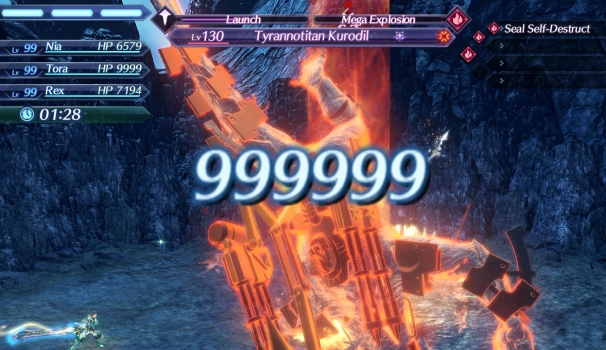
Written by Jared T. Hooper on 20 Nov 2020
Distributor Monolith Soft • Price £49.00
It's after the end of the world, and the world is just an endless sea of clouds with a bunch of giant animals doing laps around an even gianter tree. Rex is a boy who salvages knicks and knacks from the seabed for a pittance, but he might not be doing that for too much longer, because the world's about to end again after all the giant animals civilization has stuck houses on go under. It's for that reason that he dreams of making it to the top of the giant tree and finding the utopian land fabled to rest on its crown—Elysium. He receives his chance to go after meeting a pretty lady named Pyra, who wants to get there herself. Together, with the help of some friends along the way, they journey onward, to Elysium.
If there's one thing above any other that the Xenoblade games are known for, it's having huge, sprawling worlds which make the player go “Ooooo.” It does like Skyrim, where it dumps you into the world and lets you explore to your heart's content, but where Skyrim's topography makes it feel like it could be a real country, Xenoblade plays up the spectacle by decorating a mire with the most vivid cherry blossoms and sticking the whole environment in the stomach of a whale, which is a thrill Skyrim was a bit lacking in.
But between exploring Skyrim and exploring Xenoblade's Titans, I enjoyed trudging across the frostbitten tundras of Skyrim more. XC2's environments certainly are more colorful, imaginative, and always have a cliff jutting out at just the right spot for you to take a screenshot to post on Instagram, but I felt like there was actual stuff to discover in Skyrim and stories to go with those discoveries. In Skyrim, you can enter a lighthouse and have a murder mystery on your hands, and the closest XC2 comes to replicating this is a cave with a trail of blood leading in to where a bunch of carnivores are having a banquet.
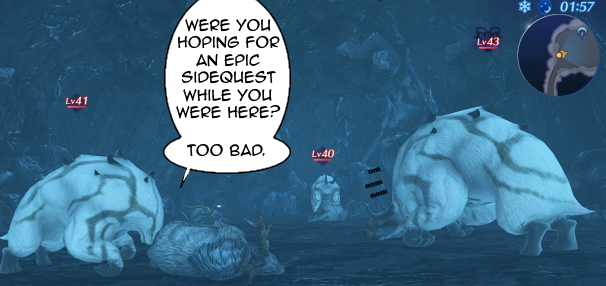
I could never shake the feeling of how video gamey the environments felt. It wasn't so much the fact that I was on the back of a giant goat as it was that the game didn't prime me to see the spectacular views. If you poke your nose around, you'll find treasure chests, spots to dig up plants and rocks with the most curious names, and landmarks.
I love peeking beneath a ridge and finding a treasure chest packed with goodies waiting on me to crack it open, but when a game puts a collectible in a hidden spot the player is expecting a collectible to be in, it firstly downgrades the world's sense of believablity and secondly arranges the player's mindset to go hiking up a mountain not for the panorama it offers but for the possibility of scoring some worthwhile goodies. It's not like Eastshade, whose main purpose is having the player look for breathtaking landscapes to paint. Finding a gorgeous lookout point in XC2 feels like a bonus rather than the active goal.
Exploring a Titan isn't without its own sense of awe and discovery, though. Not really a bother, but something which sticks out to me in most RPGs is how the enemy levels in a new area are always tailored to match your own. From a gameplay perspective, this is to bestow a sense of fairness and progression onto the player, but take a look from a worldbuilding perspective, and it doesn't make much sense how Pokémon levels align perfectly for the journey of a kid coming from some backwater town. Generally, XC2 follows this formula, but if you go off the beaten path, you'll find pockets of baddies at levels you can only dream of reaching, which adds a sense of organicness to the world. There's nothing quite like running across lush meadows and spotting a lvl. 90 Carnotaurus at the crest of a hill.
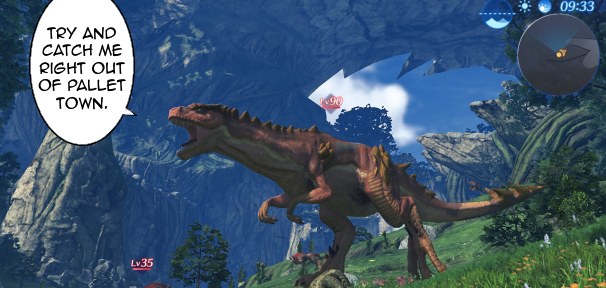
Normally, the setting in a story is a snapshot which might have a lot of detail but only shows the world as it is. There might be a lot of lore on the past, but everything's firmly rooted in the present. Danmachi, as an example, does well at slowly building up Orario, but the city doesn't feel like it's advancing toward anything. If I checked in ten or twenty years later, it's doubtful much will have changed. What makes XC2's world feel truly alive, and not just because everybody's built their homes, schools, and thrift shops on the backs of massive animals, is that it's in a transitory period. The Titans are lining up for a final dinner date with Mr. Reaper, and this is reflected in the dying biomes and the societies within those biomes. Nobody's sitting around going, “D'oh well. Might as well make as much money while I can.” Countries enter into reluctant treaties and imperative ceasefires, and what should be background geopolitics bleed into Rex's journey, punctuating his necessity for making it to Elysium. If I checked in ten or twenty years later, I would see that everybody's partying it up in Elysium or floating around on a bunch of shotty rafts.
For all the attention to detail given to the story and its worldbuilding, it suffers from an issue endemic to JRPGs, which is the narrative oftentimes disconnecting from the gameplay. There's allegedly a food shortage in one kingdom, and rations have to be doled out, but you can buy all the cabbages and churros you want. Later in the story, you're in a giant sea turtle that's taking a dive 20,000 leagues under the sea, and one of the characters marks three hours as your time limit to stop it before water pressure crumbles everybody up like candy wrappers. Then I proceeded to spend four times that limit wandering around a massive snowfield taking snapshots of the pretty scenery and helping a lady write her yaoi.
The ruleset governing what a player can and can't do determines their position the world. Link can traverse rough environments and clear dungeons with his tools and physical prowess, but he can't snap his fingers and summon God's pet dragon to exorcise Ganon permanently from Hyrule. The plot handing Rex one of the most powerful weapons in existence puts him above the NPCs, but when the narrative tells him that an entire population has to pay outrageous prices at the black market for food but those in-game prices for him are the same as what he would pay at any other store, it breaks his position in the world for no reason other than gameplay convenience. It grants him an omnipotence he shouldn't have.
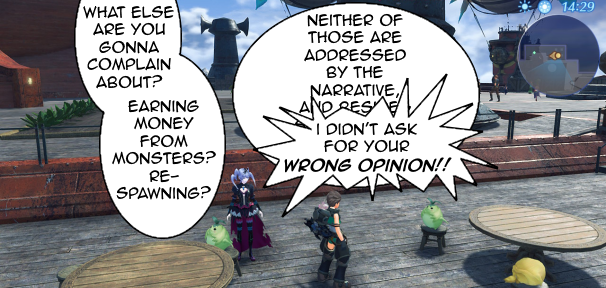
Looking at the story as a fourteen-hour YouTube video, it straps you in a roller coaster car and sends you through nonstop loops of multi-faction conflicts, societies on the brink of collapse, and divine intentions. I often found myself deeply conflicted over whether I wanted to keep all hands and feet aboard the XenoCoaster to experience the thrill of the upcoming death-of-the-mentor helix or if the completionist in me wanted to hop off so I could comb a Titan for its obligatory hidden chests. Like XC1, XC2 is expert at driving its stakes higher and higher, while tossing the occasional twist in, and it holds itself together better than its predecessor, which, to be as vague as possible so as not to drop spoilers, pulls a genre-shift out its arse during the third act.
The main plot is so balls-to-the-wall engrossing that doing a sidequest felt like reading required material for my high school English class. Most of the fault is scale. An hour-long bout against bounty hunters can't compare to a 60-hour epic. The game does, however, have some sidequests legitimately interesting in their own right. One starts you off as a simple courier for a family before becoming a murder mystery and spiraling off into a series of skirmishes against a rebellion militant group. But for every militant-espionage thriller, there's about four instances of running around picking up stuff off the ground for an obese Furby who's claiming you swindled them.
Most sidequests are just fetch quests. Alice the cat-eared babe is missing ingredients for her homemade pie, so you need to get out there and get her some, except she can't bake the pie yet, because her piece of crap oven broke, so you have to complain to the manufacturer for her, but he's demanding an arm and a leg for upfront payment, but he'll also accept a scrap of metal as jewelry for his wife, so you have to go scuba-diving for that, and only once he's fixed the bloody oven will you get your reward: a recipe for the pie you had to run all over the place to get the ingredients for.
I wish I were being hyperbolic, but this is how an actual sidequest plays out, and how the overwhelming majority of the sidequests play out. Some manage to carry themselves on intriguing plots, but most are just Rex accepting gigs on TaskRabbit. It wants to show there's more to the world than replicating Monster Hunter, and I appreciate that aim, but doing sidequests feels like checking off a grocery list. You're just following the quest marker around and pressing A until the game exclaims that you did it, you did all the things. Rex and his mates also respond to sidequest dialogue with stock phrases pulled from a hat, so it's like not even they can be arsed to give two flips about helping an obese Furby with his vegetable garden.
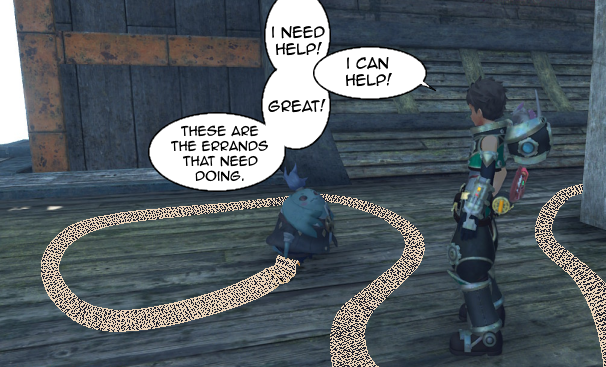
Sidequests were at their best when they took me to places I hadn't explored or made creative use of the mechanics. As is the gaming trend, XC2 has dialogue choices, inconsequential as just about all of them are, and one sidequest briefly has you flying as a hiring manager performing job interviews. It meant absolutely nothing in the grand scheme of things, but it was so refreshing to stop killing monsters thirty levels below me and go through the pains of deciding which of the three candidates was the least crappy option.
Sidequests may be fun as cleaning up peanuts after a ball game, but the combat is satisfying like stomping on crunchy leaves. Well, not at first. Combat starts out so bare-bones that you wonder how you'll ever make it through a 60+-hour game slowly swinging your sword while occasionally ripping off toenails with your Batman Grapple Gun. It's a snoozefest to begin, but as you play, you gain more abilities, and like the lot of games in the genre, there comes that moment when you stop and realize the combat kicks ass and that you kick ass. If you gear up your party just right, you can make an absolute joke of even the game's toughest bosses, making you feel godly like few other games can.
Central to making you into a future JRPG final boss is your Blade, a person, animal, or big-titted bunny girl thing kinda like the Seraphim from Tales of Zesteria, in how you pair up with them, but kinda not, in how you can swap to play as and Dragonball-fuse with a Seraph mid-battle, but a Blade just stands back as your personal cheerleader.
I was blown back by the breadth of creativity which went into the Blades' designs. The lineup varies from a gentlemanly destroyer of worlds to a young singer I want to adopt as my daughter, and half the fun in getting a new Blade is seeing what wacky, colorful form it'll take. They remind me of League of Legends's Champions, where no two Champions look even remotely alike and the lot of the female characters look like they moonlight at a D&D strip club. One Blade even looks like Orianna if she went goth.

The combat itself reminds me of League of Legends. A few mechanics are shared, such as automatic attacks and moves which need to be recharged between uses, but most of the similarities come in playstyle. There's a ton that goes into XC2's combat, and by a ton, I mean a metric ton, since that weighs more. It's easy enough to learn that you can get by by stockpiling colorful orbs on an enemy before freezing time and shattering them for explosive damage, but if you want to become a walking demigod, you have to take into consideration the perks and skills of your Blade, the bling their Driver is decked out with, if they have Ernest Hemingway or Charles Dickens in their knapsack, how much tea they've bonded over. Taking all these factors, among others, into consideration is the difference between whittling down the Titan-sized health bars of the game's enemies or demolishing them in a matter of seconds, just like how the spot you're standing in is a determiner separating the Gold from the Platinum.
Each party member lends themselves to a certain class or weapon, but the game's all about free expression otherwise. If you want to suit up your trio into a BFG firing squad, that's your prerogative. A major downside to this customization is that it makes the game desperate for a save for your loadouts. You have to switch out so much gear whenever you're tailoring your party to a certain playstyle or opponent, and it's a drag having to reequip every last Blade, accessory, and jelly doughnut every single time you go farming for loot.
A recurring theme with Blades is how they lose their memories upon their Driver's death, which, as a premise, is fascinating, as it provides a sense of mortality to otherwise immortal beings. However, this narrative is at odds with the lottery system you get the majority of the game's Blades from. Every single one of your Blades was with some other bloke before they were tagging along with you, meaning each has their own backstory. A pair of figure skaters has an entire heel-face turn arc, which not only provides a tangible history for the duo but presses into the real impact this memory-loss law has on those close to a Blade. A few Blades' personal quests do a little digging into their pasts, but for the most part, Blades seem to exist in a vacuum before popping out their shiny rocks, giving them no real place in the world before their rebirth and not explaining why their shiny rocks were found on the carcass of some overgrown arachnid. An episode-long anime-style flashback isn't necessary. The game accomplishes this bit of storytelling by making one Blade's shiny rock a drop item of a massive eel and plainly stating that her previous driver was fish food.
And just as an aside, the mechanic of relying on an RGN for getting a specific Blade can drive a person to madness when all it keeps spitting out are errand-runners.
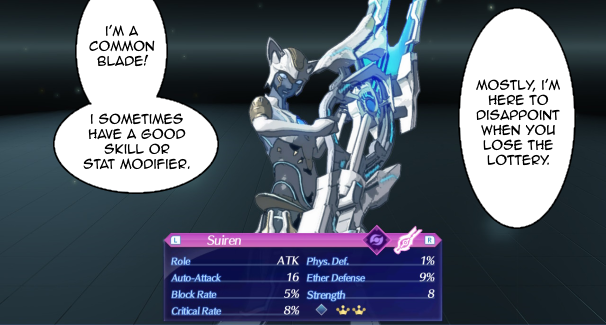
Chopping off a baddie's health bar within a snap of your fingers is unparalleled joy, but it's a joy which requires a certain mindset, and XC2 demands a mindset polarizing compared to your typical game. Slide a number of your JRPGs from your shelf and pop the disks in one after the other and you'll go into most boss fights with largely the same strategy: whittle down the boss's healthbar while maintaining your own and occasionally reacting to their unique counters and status-inducing spells. Ideally, a game will get you into the proper mindset for getting through its adventure, but the rub with XC2 is that it hardly tries that. Early on, a tutorial pops up to teach you about character stats, but you have no way of customizing your character to take advantage of or emphasize any one of those stats. Hours later, I had to look up that Dexterity was a fancy term for your accuracy, because I had no in-game way of looking that up.
XC2 not putting you into the right mindset is prevalent of an issue constant throughout the game, but I'll round back to that. Combat is the meat of the game, but there're a bunch of other sides to go with that main entrée. When you're on the frontlines and have all the Blades you need, you don't want the reserves loafing around on the couch, so you have the option of sending them out to do their own TaskRabbit gigs. If you're familiar with the assassin missions from Assassin's Creed: Brotherhood and Revelations, it's mostly the same thing and about as enthralling. Some do have accompanying storylines, which made waiting on the completion of one like waiting anxiously for the next chapter in a text novel, but they're treated like add-ons to sidequests rather than their own narratives with divergent pathways or a tangible impact on the world.
Another mechanic ripped from Assassin's Creed is the economy system, though the lot of the details differ. Completing sidequests, buying from shops, and talking to the local townsfolk builds up the economy, and when that happens, shops have more stuff to sell you at lower prices. It's just the buy-more, get-a-discount sales trick businesses use, when the real discount is to never buy in the first place.
I talk as though this mechanic is unimpressive, but it's not entirely, because it, along with other mechanics, feed tremendously well into each other. You buy goods to build up the economy, which in turn makes it cheaper to buy more goods, which are needed to unlock some Blades' skills, and some Blades need to go on TaskRabbit to unlock additional skills, and completing gigs unlocks skills which otherwise would send you to get slapped in the face twenty times or spam a certain attack until you can pull it off in your sleep.
Everything circles back to the combat. It's not like in Assassin's Creed, where you buy shops, and those shops provide you money to buy more shops, which give you more money, so you go out and buy more shops, and once you've got a tidy sum in your account, you go out and buy more shops, which give you more money, and at some point, you realize, “Wait a minute. This isn't a game, this is just capitalism.”
Just as the mechanics come back around to combat, this review comes back around to that problem with combat I teased at earlier, which is that it's got all these systems which feed into each other, but it doesn't bother hinting at their design. The game wants you to feel like a genius when you figure it out for yourself, which I respect, but if you don't, you're stuck mindlessly sending Blades to work for a little extra gold and experience, ignoring shops which sell you real swell stuff, facing bosses with little to no strategy, and killing bosses you've already beaten that are now twenty levels below you. Learning tips and tricks for a game should enhance its experience, not make it manageable. Otherwise, it feels like the game's designed purely to rack up your total playtime so that you can go and brag to your friends how you got 200+ hours out of your first playthrough even though 37 hours of that alone was hunting various species to endangerment.
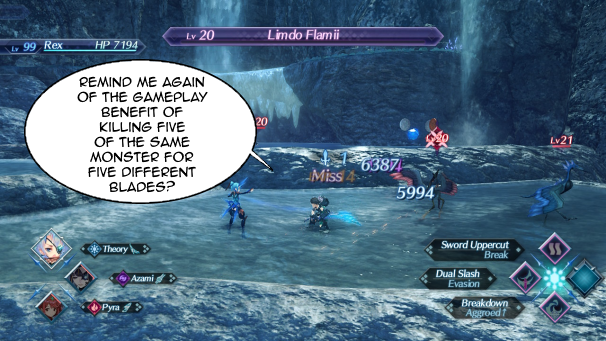
If XC2 came out in a pre-internet world, when the most help you could get from a game was whatever Nintendo Power decided to spit out that month, its lack of information would be inexcusable. Had I not found the YouTube videos I did explaining the combat, I would be griping about how the game gives you the middle finger by dropping bosses you can't beat until you're ten or twenty levels higher. However, this being a world where a grandma can google the difference between effect and affect without needing to thumb through the pages of her dictionary, it's not so much an issue. I didn't mind looking up where I could find Victory Loquat if it meant skipping the rummage through every square centimeter of a Titan's armpit. The last game I spent an equal amount of time looking up content was Skyrim.
There's a fair amount of discussion, I feel, which can be generated around XC2's design and whether turning to the community for guidance is a viable aspect to fully understanding the product. Enjoyment of a game comes from how enriching the experience is for the player, and anything which enhances that experience can only be viewed as a positive thing, whether that enhancement is a YouTube tutorial or a friend offering their two cents. Ideally, a game will teach the player everything they need to know without having to resort to outside help, and XC2 gets points docked for not meeting this threshold, but it almost seems like a moot criticism if a player can hate a game at first, come back to it later after consulting YouTube guides, and finish the game while hailing it as their all-time favorite.
An entire DLC pack is available, and unless you're one of those types who judges a game based on its first twenty-seven seconds, I would say go ahead and buy it with the core game. The lot of the content is complementary, if just more bland sidequests, and plus, it comes with some of the best Blades in the game. Some of them are too good. One's supposed to be a tank, but he has an incredible healing attack and is capable of more damage than the vanilla offensive Blades.
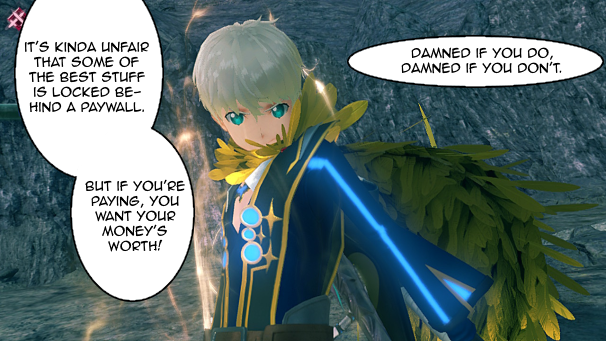
There's a lot to be said about XC2, since it's such a huge game, but everything above this line addresses the selling points on the back of the box, and most finer details or miscellany I mention can all be summarized with the following phrase: a moment of intrigue or brilliance marred by a missed opportunity or muck-up.
Chapters end with a simple black-and-white title card which appears at an emotionally high moment, stunning the player, but that effect is dampened when the chapter title is revealed at the start of each chapter.
Pyra in a cutscene remarks how delicious the tea at one shop is, hinting at her favorite tea required to unlock a skill, but her favorite tea is actually sold on a completely different Titan.
A Blade you get relatively early into the story has a skill called Foresight, which allows Rex to see a few seconds into the future in cutscenes, but it's just a passive evasion buff in gameplay.
One story character has notoriously bad luck, but when he joins your party, his luck stat is in line with everybody else's.
It discreetly integrates a tutorial on Informants within the main story, but the information Informants sell you is essentially “Press B to jump.”
There's an arcade game you play to get parts and crystals to upgrade the most customizable Blade in the whole game, and the arcade game's fun, with tight controls, but grinding up the requirements to deck out your android Blade is like saving up for a yacht by part-timing at McDonald's.
Areas you can get to are sometimes dependent on the tide, but the game gives up on this mechanic almost as soon as it's introduced.
Secret areas dot the Titans, but they're all either plainly visible on the map or are too easy to get to, if not on the required path.
Dialogue is on occasion hilariously snarky, but the game bashes its face against the floorboards when it tries to be funny.
Characters will namedrop locations early on, making dialogue feel more organic, but then characters later on will pull that amateur move of explaining things the characters already know but the audience doesn't, except they're explaining things the characters and the audience already know.
The characters ask why it is that Blades lose their memories, but they never stop to consider why they spawn with lances and katanas rather than, say, microwaves or typewriters.
All of this said, there are a number of things this game does right and without fail. Enemies learn not to pick on you once you're ten or so levels stronger, so you're not grappled into pointless fights when you're running from Point A to Point W. Level-grinding's also non-existent, since you can level up with bonus experience by taking a nap.
Initially, the title screen fell into its own category of disappointment. It's just storm clouds and a piano sonata, which is a huge step down from XC1's gorgeous landscape and hauntingly beautiful orchestral piece, but it's apples and oranges, because XC2 swaps out the title screen dependent on where in the story you are, hinting at upcoming locations and characters, and once you've beaten the game, you're treated to a beautiful seascape that's its own reward.
The title screen is done wonderfully at the start of the game, and another thing is done even more wonderfully at the end, that being the ending. I won't say more than the combination of the final song and the muted visuals makes for one of the best and emotionally resonating endings I've seen in a long time.
Also, the soundtrack. Apparently, it's a cardinal sin to discuss this game without proclaiming how wonderful the soundtrack is. Personally, I preferred XC1's soundtrack, and it wasn't until I listened to XC2's soundtrack outside the game that it grew on me. Most of my favorite songs can be described with an adverb followed by the adjective beautiful—somberly beautiful, wistfully beautiful, mysteriously beautiful—and one can be described as surprisingly jazzy.
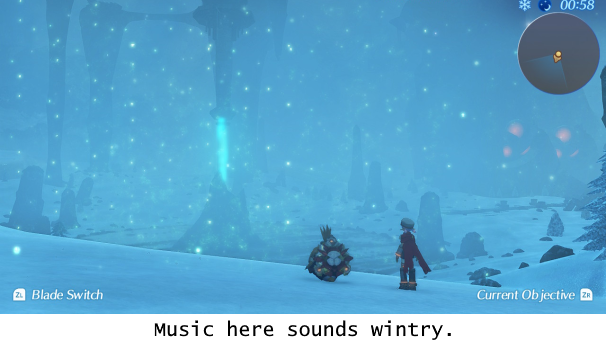
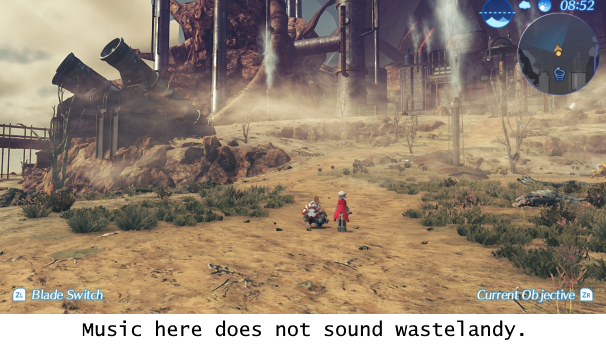
I've levied a lot of criticisms at Xenoblade Chronicles 2, but none of them are to suggest that the game is subpar by any measure. The story is a start-to-finish roller coaster, the setting's endlessly imaginative, the main cast is charming, funny, and lovable, and strutting your stuff as a demigod is too addicting. It has its faults, issues, and rough edges, but none of it's for lack of trying. It's a few touches misguided at times, but when it puts its all into something, it'll inflict Blowdown on you.
Xenoblade Chronicles 2 is like a kid in class who's a guitar prodigy, and when you ask him to jam for you, he won't show you more than a few basic chords. But if you go to his friend, they'll show you to his house, where you'll find him in his garage shredding You Will Know Our Names.
-----
Xenoblade Chronicles 2 has drawn controversy with the promiscuous outfits of most of its female Blades. Click here if you want to find out where it went wrong and how it could improve on its sexual content.

Just writing about the video games that tickle my fancy when the fancy strikes.
posted by Jared T. Hooper on 17 Feb 2026
posted by Ross Locksley on 11 Feb 2026
posted by Jared T. Hooper on 06 Feb 2026
posted by Eoghan O'Connell on 04 Feb 2026
posted by Ross Locksley on 03 Feb 2026
posted by Jared T. Hooper on 21 Jan 2026
posted by Ross Locksley on 16 Dec 2025
posted by Ross Locksley on 10 Dec 2025